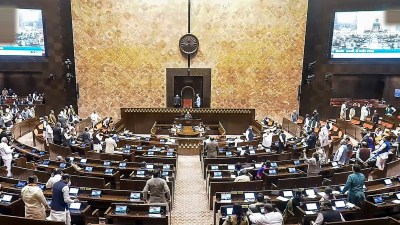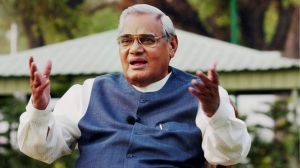SC extends ED chief’s term till Sept 15 in ‘national interest’: what is the case, what has court said previously?
The Centre had approached the SC seeking a tenure extension for Mishra till October 15. Before this, the SC had declared the two tenure extensions granted to Mishra as “not valid in law”.
 Initially, Mishra was appointed to the post for two years by an order dated November 19, 2018. (File)
Initially, Mishra was appointed to the post for two years by an order dated November 19, 2018. (File) The Supreme Court Thursday allowed Sanjay Kumar Mishra to continue as the director of the Enforcement Directorate (ED) till September 15, instead of the earlier July 31 deadline.
A bench of Justices B R Gavai, Vikram Nath and Sanjay Karol said it was granting the extension in “larger public and national interest” but that Mishra would cease to remain ED chief from the midnight of September 15.
The Centre had on Wednesday approached the Supreme Court seeking a tenure extension for Mishra till October 15.
Before this, the Supreme Court had declared the two tenure extensions granted to Mishra beyond September 8, 2021 as “not valid in law”.
When it approached the SC again requesting an urgent hearing, the government, through Solicitor-General Tushar Mehta informed a Justice BR Gavai-led Bench that it was “compelled to approach” the “court seeking extension of the date up to 15.10.2023…in view of the ongoing FATF review, which is at a critical stage where submissions on effectiveness have been made on 21.07.2023 and on-site visit is scheduled to be conducted in November 2023”.
What “compelled” the Centre to seek another extension?
In a plea filed seeking modification of the top court’s July 11 verdict, the Centre reasoned that the court had earlier permitted Mishra an extension of tenure given the government’s concerns over the ongoing Financial Action Task Force (FATF) review.
Describing the process at length, the government’s application said that the FATF is an inter-governmental body that has “developed its recommendations to prevent and combat money laundering and terror financing”. About 200 countries/jurisdictions, including India, are committed to implementing these standards, the government said.
To this end the “FATF conducts peer reviews of all its member countries on a regular basis to assess levels of implementation of the FATF recommendations and provide an in-depth description and analysis of each country’s system for preventing criminal abuse of the financial system,” the application reads.
Terming this mutual evaluation exercise as a “comprehensive multi-stage” one involving “investigating agencies, prosecutors, intelligence agencies, regulators, policy making” and “international and internal cooperation and coordination amongst them” the Centre said that India is currently in its fourth stage of the process. However, owing to factors like the COVID-19 pandemic and delay in FATF’s assessment process, India’s mutual evaluation got postponed to 2023, the Centre said.
Emphasising the need for Mishra’s continuance, the government said, “At such a critical juncture, it is essential to have an individual who is well-acquainted with the overall status of money laundering investigations and proceedings across the country and also the intricacies of the procedures, operations and activities of the investigating agency, at the helm of affairs at the Directorate of Enforcement.”
Additionally, the Centre said that it is necessary to ensure that the assessment team can be promptly and ably assisted with necessary reports, information, statistics and cautioned against “any transition in leadership” at this stage as it “would significantly impair the ability of the agency to provide necessary assistance to and co-operation with the assessment team and thereby adversely impact India’s national interests.”
The Centre also drew attention to the fact that although the orders dated November 17, 2021, and November 17, 2022, allowing the extension of Mishra’s tenure were declared “illegal” by a bench of Justices BR Gavai, Vikram Nath, and Sanjay Karol, the court still took into consideration the concerns surrounding the FATF review.
“Though we have held that orders dated 17th November 2021 and 17th November 2022 granting extensions to respondent No.2 are not valid in law, we are inclined to take into consideration the concern expressed by the Union of India with regard to FATF review. We are further inclined to take into consideration that the process of appointing the Director of Enforcement is likely to take some time. In that view of the matter, we find that in order to ensure the transition to be smooth in the larger public interest, it will be appropriate to permit respondent No.2 to continue to be in office till 31st of July 2023,” the July 11 ruling said.
Towards this end, the plea was filed by the government before the apex court for modification of the Court’s July 11 verdict.
What was the July 11 verdict?
In “Dr. Jaya Thakur vs. Union of India”, a three-judge bench of the Supreme Court held that the two tenure extensions granted to Mishra, beyond the previously fixed September 8, 2021 cut-off date, were “illegal”. While attempting to put brakes on the Centre’s exercise of repeatedly seeking tenure extensions for this post, the top court held that Mishra could continue with the post only till July 31.
In November last year, the 1984-batch IRS officer was granted a second tenure extension up to November 18, 2023. However, the court on July 11, struck down this extension on grounds that it violated its September 8, 2021 ruling in “Common Cause (A Registered Society) v. Union of India & Ors”.
However, the three-judge bench, in the July 11 ruling, upheld as constitutional the amendments made to the Central Vigilance Commission Act, 2003, The Delhi Special Police Establishment Act, 1946, and the Fundamental Rules in 2021, enabling Mishra’s tenure extension(s).
What was the 2021 ruling?
On September 8, 2021, a Bench of Justices B R Gavai and L Nageswara Rao upheld the Centre’s order extending the tenure of Mishra beyond two years. However, the Bench said that “extension of tenure…to officers who have attained the age of superannuation should be done only in rare and exceptional cases”, and that such extensions “should be for a short period”.
The court said, “There is no fetter on the power of the Central Government in appointing the Director of Enforcement beyond a period of two years”. On Section 25(d) of the Central Vigilance Commission Act, 2003, which lays down the minimum tenure of an ED Director, the SC said, “The words ‘not less than two years’ cannot be read to mean ‘not more than two years’.”
Why was this question before the court in the first place?
Initially, Mishra was appointed to the post for two years by an order dated November 19, 2018. On November 13, 2020, the Centre extended his tenure by a year. This led the NGO Common Cause to file a PIL seeking that the November 13, 2020 order be set aside since Mishra’s overall tenure of three years violated Section 25 of the CVC Act.
In November 2021, with the one-year extension to Mishra coming to an end, then President Ram Nath Kovind signed ordinances that amended the laws governing the CBI and ED, enabling the government to keep the two chiefs in their posts for one year after the completion of their two-year terms and to keep giving these one-year extensions until they complete five years as chiefs.
However, in May this year, Justice Gavai said he was of the prima facie view that the 2021 case had not been rightly decided, and required reconsideration. He said the case did not involve a question of extension then. Thus, the question resurfaced before the court before it culminated in the July 11 ruling.
- 01
- 02
- 03
- 04
- 05






































